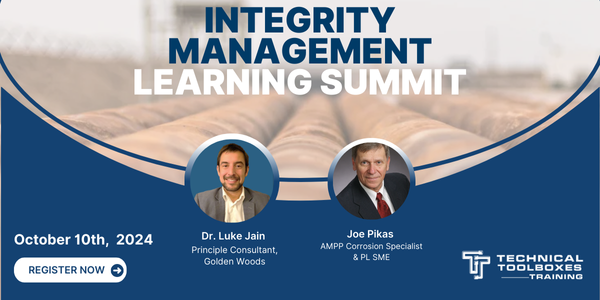Basic Pipeline Corrosion Theory
-
Author: Technical Toolboxes
-
Level: Beginner
-
Study time: 1 hour
Write your awesome label here.
What are the different types of pipeline corrosion and how do they impact pipeline integrity? What methods are effective for corrosion control in pipelines? How can professionals effectively manage pipeline corrosion in their roles?
This introductory self-paced course provides a foundational understanding of pipeline corrosion, essential for maintaining the integrity and safety of pipeline infrastructure.
By the end of this course, participants will be able to demonstrate a comprehensive understanding of the fundamental principles of pipeline corrosion, including defining corrosion and its impact on pipelines, explaining corrosion cells and their role, and identifying various types of pipeline corrosion. Additionally, the course covers corrosion control methods, the oxidation/reduction process in corrosion, and differentiates between conventional, ionic, and electron flow in corrosion.
Learners will also describe polarization and its effects, interpret the Galvanic Series for material selection, and analyze the causes of pipeline corrosion. This course equips participants with the essential knowledge to effectively address and manage pipeline corrosion in their professional roles.
This introductory self-paced course provides a foundational understanding of pipeline corrosion, essential for maintaining the integrity and safety of pipeline infrastructure.
By the end of this course, participants will be able to demonstrate a comprehensive understanding of the fundamental principles of pipeline corrosion, including defining corrosion and its impact on pipelines, explaining corrosion cells and their role, and identifying various types of pipeline corrosion. Additionally, the course covers corrosion control methods, the oxidation/reduction process in corrosion, and differentiates between conventional, ionic, and electron flow in corrosion.
Learners will also describe polarization and its effects, interpret the Galvanic Series for material selection, and analyze the causes of pipeline corrosion. This course equips participants with the essential knowledge to effectively address and manage pipeline corrosion in their professional roles.
-
Video time: 1 hour
-
Exams: 1
Joe Pikas
Content SME-V.P. for Pipeline Integrity and Corrosion Engineering Services for Technical Toolboxes
ABOUT JOE
Joe Pikas is a consultant for Technical Toolboxes with more than 50 years of experience in pipeline construction, operations, corrosion control design, and implementation, including pipeline engineering management.
He is an expert in pipeline integrity management, risk management, coating materials selection, cathodic protection design, and testing, and internal and external pipeline corrosion control.
In 2009, he was awarded the NACE Distinguished Service Award and received an industry award in 2002 from AGA, GTI, INGAA, NACE, OPS, and PRCI International.
Also, he has contributed over 50 papers to industry trade magazines, NACE, SSPC, and other publications and conferences.
He is an expert in pipeline integrity management, risk management, coating materials selection, cathodic protection design, and testing, and internal and external pipeline corrosion control.
In 2009, he was awarded the NACE Distinguished Service Award and received an industry award in 2002 from AGA, GTI, INGAA, NACE, OPS, and PRCI International.
Also, he has contributed over 50 papers to industry trade magazines, NACE, SSPC, and other publications and conferences.

